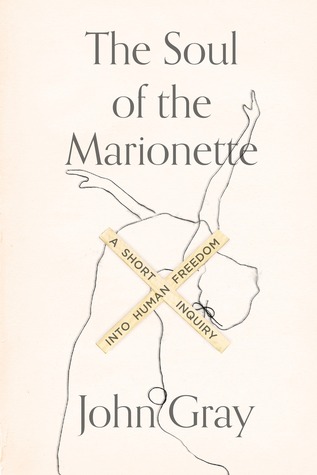
The Soul of the Marionette
A Short Inquiry into Human Freedom
کتاب های مرتبط
- اطلاعات
- نقد و بررسی
- دیدگاه کاربران
نقد و بررسی

February 9, 2015
In this meandering but often insightful look at the human condition, Gray (The Silence of Animals) offers a number of predictions. Among them is the extended syllogism that begins with his major premise that all matter thinks, moves through the minor premise that machines are matter, and concludes that machines (along with plants and jellyfish) are—or someday will be—self-aware. As the march of scientific knowledge leads to thinking machines, the upshot for us carbon-based life forms “might well be human redundancy.” Gray’s thesis is disturbing but hardly groundbreaking, bringing to mind Isaac Asimov’s 1956 story “The Last Question.” Gray’s musings on politics can be equally disturbing and are at times less convincing, such as his pronouncement that “the military-industrial complex no longer has the centrality it once did.” Still, with examples that include ancient Greeks, early Christians, Aztecs, Jeremy Bentham, and Philip K. Dick, to name but a few, this remains an intelligently written, thought-provoking book. Agent: Tracy Bohan, Wylie Agency.

February 1, 2015
Within the debate between Christian and atheist authors, here come the Gnostics.In this brain-twisting meditation on freedom, Gray (The Silence of Animals: On Progress and Other Modern Myths, 2013), a former professor across disciplines (at Harvard, Yale and Oxford), covers a wide expanse of intellectual territory, from the ancient Greeks to science-fiction futurism. Yet the underpinning theme concerns Gnosticism, which the author describes as "the faith of people who believe themselves to be machines," for whom "the creator was at best a blunderer, negligent or forgetful of the world it had fashioned, and possibly senile, mad or long dead; it was a minor, insubordinate and malevolent demiurge that ruled the world." Gray finds in this ancient belief a visionary illumination of our modern predicament, in which reason has shown itself to be more curse than blessing, progress is an illusion, and the machines man has invented might soon render mankind obsolete. He finds a kindred spirit in Philip K. Dick, "a brilliantly original writer of science fiction who uses the genre to question what it means to be human" and who once wrote, "it is not man who is estranged by God; it is God who is estranged from God. He evidently willed it this way at the beginning, and has never since sought his way home." Gray connects the dots among science fiction (including that of Stanislaw Lem), Borges, the human-sacrificing Aztecs, global warming and the loss of privacy (and freedom) that the cyberrevolution has wrought, challenging readers to make some leaps of logic and come to counterintuitive conclusions. "Human beings may behave like puppets," he writes, "but no one is pulling the strings....We think we have some kind of privileged access to our own motives and intentions. In fact we have no clear insight into what moves us to live as we do." A brief, elliptical inquiry designed to raise more questions than anyone could answer.
COPYRIGHT(2015) Kirkus Reviews, ALL RIGHTS RESERVED.

February 15, 2015
Gray's (The Silence of Animals; The Immortalization Commission) book claims to be an inquiry into human freedom but reads like a collection of anecdotes strung together by a jaded, unreliable narrator. The work describes several conceptions of freedom from philosophy, art, and sf that skirt the more conventional concerns about the topic of freedom of the will, such as freedom from suffering, doubt, and having to make one's own choices. Unfortunately, the text inexplicably glosses over the entirety of the current free will debate. While divided into three sections and further into a number of vignettes, the book seems to have an overarching theme that freedom is an illusion and religion something worse. The author ultimately states but doesn't defend a somewhat nihilistic compatibilist stance. Human beings, Gray declares, are accidents of evolution whose only freedom is the old compatibilist standby--the ability to do as one wants. It's difficult to call this a philosophical text as the author makes wild and unsupported claims about history, religion, and science. VERDICT Although erratic and undefended, there is nothing new here. Others explore these topics with more rigor and intellectual honesty.--William Simkulet, Univ. of Wisconsin-Marshfield/Wood Cty., Marshfield
Copyright 2015 Library Journal, LLC Used with permission.

Starred review from March 15, 2015
In musings about how fairground puppets defy gravity, the German writer Heinrich von Kleist provides Gray with his entry point into wide-ranging reflections on the meaning of human freedom. For in Kleist's hope that humans might themselves someday defy the pull of the earth, Gray discerns the dominant modern understanding of freedom, traceable back to ancient Gnostics who yearned to sunder all restraints, material and intellectual. Readers, in fact, learn how Descartes and other modern thinkers have reinforced such Gnostic aspirations by glorifying free will as a godlike faculty springing from the species' capacity for self-awareness. Intent on enlarging self-awareness by dispelling mystery and vanquishing ignorance, these modern Gnostics have promised to smash every fetter. But Gray warns that Gnostic projects for liberating humans have repeatedly carried individuals, and even entire nations, into delusional fantasies and murderous zealotry. Readers then contemplate a very different conception of freedom, one premised not on self-awareness (which humans actually share with other species) but rather on self-division (found only in Homo sapiens). Acknowledging our baffling self-division gives humans no liberating power over the cosmos, but Gray finds in such acknowledgment an inner emancipation born of honest recognition of how often we must act in ignorance and physical weakness. Illusion-piercing sobriety.(Reprinted with permission of Booklist, copyright 2015, American Library Association.)

























دیدگاه کاربران